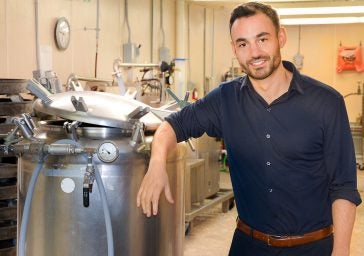
By Neil Nachbar
The path to success isn’t always a straight line. After Brian Bonk dropped out of high school, he wasn’t sure where the path even started – never mind where it would lead.
After discussing his circumstances with an admissions counselor at the University of Rhode Island, Bonk was given an opportunity to enroll on a trial basis. It didn’t take long for Bonk to prove he belonged at URI. His hard work and academic achievement would lead to a Presidential Scholarship and a bachelor’s degree in chemical engineering in 2011.
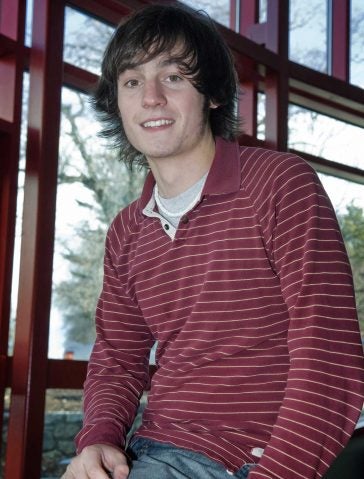
Bonk continued his education at the Massachusetts Institute of Technology, where he earned a doctorate in biological engineering. Unlike many of his peers who went on to work for biotechnology companies, Bonk invested in a 100-year-old company in Arkansas called Pel-Freez that was known for its rabbits. Bonk identified the enormous potential of the other side of the company, which produces high-quality raw materials and intermediates for some of the world’s largest vaccine and diagnostic companies.
Q: Why did you drop out of high school?
A: My family moved to Westerly, Rhode Island from the Midwest when I was 16. I completed the 10th grade at The Prout School, down the street from URI. However, I struggled with severe depression throughout high school to the point where I stopped attending classes and eventually withdrew from school at the beginning of 11th grade.
Q: How did you get accepted to URI?
A: When things blew over, I was 18. I had two years of high school under my belt and wasn’t sure what to do next. I thought, should I go back and finish high school, get a GED or go to community college? I met with an admissions counselor at URI and explained my situation. They agreed to enroll me as a non-matriculating student for a semester on a trial basis. The deal was if I did well in my trial semester, they would enroll me as a full-time student. Not having taken high school pre-calculus, I had to work very hard during that trial semester, but I managed to ace my classes, which included the introduction to engineering, calculus and physics courses. I enrolled as a full-time student the following semester and URI generously offered me the full-tuition Presidential Scholarship for the rest of my studies.
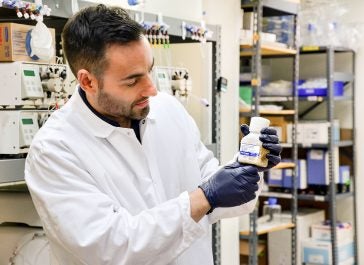
Q: Why did you decide to major in chemical engineering?
A: I come from a family of scientists and engineers. I grew up listening to my father and uncle, who were a chemist and chemical engineer respectively, geek out on all sorts of science-related things around the dinner table. I remember my uncle talking about the concept of “programmable matter” at a family function and thought it was the coolest thing I’d ever heard. Hence the decision to go with chemical engineering. It’s one of the most versatile degrees and exposes you to the intersection of many fields in a very rigorous way.
Q: What motivated you to do so well academically?
A: I was actually a very good student all through school, albeit a rather troubled one in my teenage years. Once I enrolled at URI, I decided early on that I wanted to get involved with research. I was fortunate to find some excellent research mentors – in particular Professor Angelo Lucia in chemical engineering, Professor David Freeman in chemistry and Assistant Professor Daniel Udwary in pharmaceutical sciences. My research work with them eventually led to the Goldwater Scholarship, which was a huge honor.
Q: How did you build upon what you learned at URI while at MIT?
A: At MIT, my dissertation was focused on computational enzyme and protein design, which in many ways was an application of the skills I learned through my undergraduate research work into more complex biological applications.
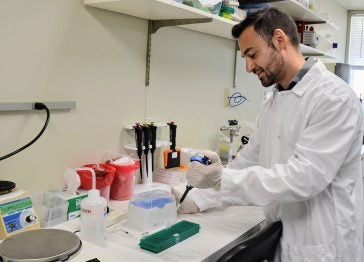
Q: How did you gain the capital to acquire Pel-Freez?
A: My long-term career goal was never to be a researcher, it was to get good at something on the forefront of technology and become an entrepreneur. I had a lightbulb moment when I stumbled upon an article about an increasingly popular alternative career path for MBA students called a search fund.
The idea behind a search fund is that there are thousands of profitable baby boomer owned businesses, where the aging owners are looking to retire, but their kids don’t want to take over and maybe the business is too small or weird for a traditional acquisition by a larger company or private equity firm. This creates an opportunity for younger entrepreneurs to take over these companies at a relatively discounted price. An entire community of investors has developed around this model – the investors bring the capital and experience, while the young entrepreneur brings the energy and spunk, in exchange for a sweat equity stake and the opportunity to take on a leadership role early in their career. The catch for the searcher is that attractive deals can take an excruciatingly long time to find and negotiate, and are usually in unsexy industries located far from major urban areas.
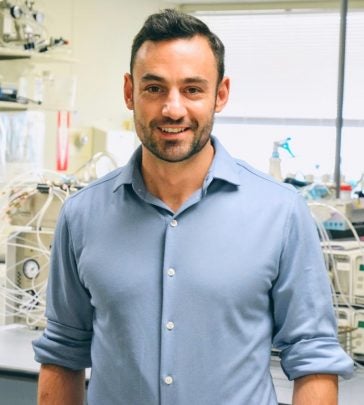
I became obsessed with the idea of doing a life science-focused search fund since there wasn’t anyone with my background doing it. I read every book, blog and article I could find, talked to dozens of searchers and investors, took as many management classes as I could squeeze into my dissertation research schedule, and enrolled in a class at Harvard Business School that specifically focused on the nuances of acquiring and operating smaller firms.
The professors of that class also happened to be highly successful investors and occasionally funded their students in small business acquisitions. I pitched the idea of buying a small life science business to them, and over the course of the year we connected and formed a partnership once the class was over. They basically funded me to go out and find the perfect company – a niche, under-the-radar, enduringly profitable life science business. Then they put up the capital for the acquisition once I found it and negotiated a deal – a process which took about two and a half years.
That perfect acquisition was Pel-Freez, in Rogers, Arkansas.
Q: What is it like to run a company that is historically known for rabbits?
A: Pel-Freez began over 100 years ago as a backyard rabbit farm and grew into the largest rabbit meat producer in the United States by World War II when rabbit was still widely consumed in this country. It was a third-generation family business before we acquired it.
After World War II, the life science industry began to take off and researchers with nowhere else to go for raw materials needed to perform their assays began contacting the rabbit meat company. From the 1950s onward, the biological part of the business grew to the point where the meat became the byproduct of the biological business and not the other way around as it began.
Today, the company is a sophisticated biomedical reagent supplier to the world’s largest vaccine and diagnostic companies.
Q: What is your average workday like?
A: I focus 90 percent of my efforts on growing the business, whether it’s acquiring new customers or business opportunities or developing our existing capabilities. I leave the other 10 percent to putting out fires and solving day-to-day management challenges. In practice, that ratio is often flipped or somewhere in between.
Q: How much of a demand is there for your company’s biological materials?
A: Most people have no idea that the reagents supporting the biotech industry originate from a bunch of Amish rabbit farms in Kansas. While most of my friends are still in Boston or San Francisco doing the sexy side of biotech, it’s fun being down here in Arkansas behind the scenes.
I like to think of us as a “picks and shovels” business for the life science industry. The biotechs and pharmas are the gold miners and we’re Levi Strauss and Co. supplying the relatively mundane, but critical supplies.
Q: Did Pel-Freez supply materials that led to any of the COVID-19 vaccines?
A: The majority of the vaccine programs we support are for bacterial conditions, like pneumococcal disease or meningitis. This is due to the specific immune responses elicited by bacteria, which require products like ours for efficacy testing and research and development assays. I can’t disclose specific programs that we support, but some of our products were used in COVID diagnostic development.
Q: What are your short-term and long-term goals for the company?
A: My short-term goal is to get this company up to its full potential in terms of production capacity and market share over the next couple years. We took over a great company, with a fascinating history, but one that was under-marketed and under-capitalized for growth in the last several years by the previous ownership.
Longer term, the sky’s the limit. We have hundreds of great, long standing customer relationships and a talented, hard-working team. My goal is to continue to leverage these assets to launch new products, strengthen existing product lines and enter new areas of business until I get bored, which I don’t expect to happen for a long time.
Q: How did you end up joining the URI chemical engineering advisory board?
A: After nine months in Arkansas, I got nostalgic and visited my family and friends in New England. Knowing that I wouldn’t get back to Rhode Island for a while, I reached out to some former mentors at URI to catch up and thank them for taking me under their wing, including Professor Angelo Lucia who is the department chair for chemical engineering. After a nice lunch and conversation, he invited me to join the department’s advisory council to provide feedback from an industry leadership prospective. It’s a huge honor and a great opportunity to give back.
Q: What advice do you have for engineering students who would like to become entrepreneurs?
A: One thing I didn’t fully appreciate until long after I completed my undergraduate studies is that there are many different paths to success and they are almost all highly non-linear. An engineering degree is a great way to learn a lot of valuable skills, but it’s important to keep in mind that school has a way of funneling you into thinking that success is only achieved along very linear career tracks. You generally aren’t told that you can find capital, buy a random business and be your own boss right out of school. Often the best opportunities are outside your comfort zone and far from the established “normal” career tracks that other smart people are competing for. Keeping this in mind also makes life more fun and takes the sting away from what might feel like a short-term setback.
